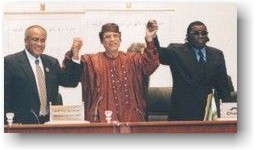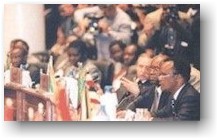An
African Union Leaders take step toward Nkrumah's dream of One
Africa
|
 SIRTE
(FinalCall.com)� The establishment of an
African Union that will keep the continent viable, even thriving, in the
face of mounting challenges from globalization and a united European
community was reaffirmed here March 1-2 by more than 44 representatives
of African governments, including many heads of state. SIRTE
(FinalCall.com)� The establishment of an
African Union that will keep the continent viable, even thriving, in the
face of mounting challenges from globalization and a united European
community was reaffirmed here March 1-2 by more than 44 representatives
of African governments, including many heads of state.
The 5th Extraordinary Summit of the Organization of
African Unity (OAU), or Sirte II, ended with solid support from the OAU�s
53 member states for the Constitutive Act of the African Union, a
document that establishes the various institutions of the African Union.
The remaining holdout countries put their signatures to the document
during the summit, meaning that the establishment of an African Union
has support from all OAU member states. At Final Call press time,
31 nations had officially ratified the Constitutive Act. Thirty-six
member states must ratify before the Constitutive Act can be enacted,
calling into existence a Pan-African Parliament; a Court of Justice; an
African Central Bank with a common currency; African Monetary Fund; and
an African Investment Bank.
"Here we re-establish the balance that was lost
in the world � that can�t be restituted by weapons of mass
destruction or hegemony and dominion, but rather by the people�s
will," said Libya�s Col. Muammar Gadhafi, the summit�s host,
during the closing session.
"Africa has no intercontinental ballistic
missiles or nuclear weapons, but Africa today is stronger than those who
possess cruise missiles. We created this day based on a sea of tears and
sweat and blood and martyrs. Glory to African men and women in the
struggle," he said.
The latest call for a United States of Africa came
from Col. Gadhafi several years ago during a July 1999 meeting of the
OAU in Algeria. That clarion call resulted in the signing of the Sirte
Declaration here on Sept. 9, 1999, a document setting the pace for
establishing such an African Union.
In Lome last July, the Constitutive Act for an
African Union was signed by many of the leaders, with the remaining
signing here. It was hoped that a majority of nations ratifying the
document would be reached here.
 Once ratification is reached, now expected to happen
during the annual OAU meeting in Lusaka in July, movement toward
establishing the five institutions will begin. Once ratification is reached, now expected to happen
during the annual OAU meeting in Lusaka in July, movement toward
establishing the five institutions will begin.
It is hoped that these institutions�a Pan-African
Parliament, a Court of Justice, Central Bank, Monetary Fund, and
Investment Bank�will help to:
-
achieve greater unity between countries,
-
defend the sovereignty and territorial integrity
of member states,
-
promote democratic principles, institutions and
good governance,
-
promote and protect human and peoples� rights,
and
-
help the continent to play its rightful role in
the global economy, among other objectives.
The Pan African Parliament initially will have
consultative and advisory powers only, while its ultimate goal is to
evolve into an institution with full legislative powers, whose members
are elected. As currently written, the Parliament will consist of five
members from each state, at least one being a female.
As the African Union progresses, a common currency
will be introduced for the continent and a common defense force
ultimately will be established.
"I call this the second liberation of
Africa," Zakaria M. Abdi, Somalia�s minister of information, told
The Final Call, explaining that independence brought Africa
freedom from colonialism. Today the struggle is for political, economic
and social liberation, he said.
Throughout Ouagadougou Hall, references to the
Founding Fathers of the African liberation movement�names like
Nkrumah, Nasser, Lumumba, Sekou Toure, and those who founded the OAU
with the idea of a United States of Africa�were never far from anyone�s
lips.
"When the OAU started in �63, the environment
was different in Africa and the world, but despite this the founding
fathers did teach the thought of a common currency, a common parliament
and common market. All these ideas were enshrined in the �63 summit
establishing the OAU," said Ibrahim Dagash, former OAU spokesman
who now is special advisor to the Pan African News Agency.
He said the OAU is a one-of-a-kind continental
organization of heads of state whose task now is to transform itself
into the African Union, an organization that will bring the group closer
to ordinary citizens of Africa.
It is the day-to-day concerns of the average citizen
that Bernard Ngwa, a journalist from Cameroon, talked to The Final
Call about. He said he�s seen an upsurge in support for the
African Union among leaders since the OAU meeting in Lome, Togo. But the
discussion about a United States of Africa is not something on the lips
of the man on the street.
"They�re more concerned about bread and butter
issues," he said. "Given what I see day to day, the misery and
suffering, the abject poverty, especially south of the Sahara, if this
movement becomes a reality, I see it having a positive impact on the
lives of men, women and children.
"My children should be able to grow up in a
society where there is lots of opportunity and prosperity, good
education and income," he said. "If being together in a union
can help the different states, especially those having conflicts, if it
could enable them to speak rather than fight, then having an African
Union certainly has more advantages than disadvantages."
Min. Akbar Muhammad, Nation of Islam international
representative, who has closely observed and attended OAU meetings to
establish the African Union, told The Final Call that an African
Union will mean freedom of movement of goods and people.
He questioned why an Algerian should need a visa to
go to Zambia, or why a Ghanaian has to fly to Europe to get a flight
into Tripoli. Or even a phone call going from Nigeria to Ethiopia must
oftentimes first go through Europe.
"The Europeans, in building the EU, see the
necessity of not only the freedom of movement of goods, but the freedom
of movement of human beings. So they call it a Europe without
borders," he said, also noting Africa�s need to develop its
infrastructure. "It means freeing Africans to move freely, to
consolidate the small amount of wealth they have and to be able to give
a better quality of life to their people. It allows the government to
save money instead of trying to live as a small, independent government
in a world that is vastly becoming smaller."
And how should the west greet the United States of
Africa?
"They should stand up and applaud what happened
at the Sirte II conference, but the west is not happy," Min. Akbar
continued. "The west loves a balkanized Africa, because it�s
easier to control and they can continue to rob Africa of her rich
natural resources." (See interview on page 6.)
Dr. Mohammad Somorra, Sierra Leone�s ambassador to
Libya, agrees. He cites the sabotaging and destabilizing that took place
during the founding OAU charter.
He noted that some of the delays in the Sirte II
meeting were because "everybody in Africa wants to be a president
or a prime minister and rule each other�s state." Also, the
disparity among African countries was a major concern, he said.
Regarding the persistent question asked by mostly
European journalists concerning Mr. Gadhafi�s role in the African
Union, Mr. Somorra responded as most African leaders have:
"We don�t have to be like the colonialists or
our detractors in the west who want to see Africa as between Arab and
Black Africa. We�re all Africans," he said.
"Colonel Gadhafi is one of Africa�s leaders
who has lived before his time. He�s a Nkrumah or an Abdel Nasser
resurrected. This is our last chance," he said.
President Charles Taylor of Liberia told The Final
Call that Africa could no longer afford to have decisions for the
continent made outside of Africa. He noted the "200 years of trial
and error" before the United States became a stable country, and
that establishing an African Union will take time and patience.
"When you have people who are hungry, naked,
dying of different diseases, it�s impossible to have the type of
stability the west is enjoying. We must begin to use Africa�s
resources in the generation of finance and capital to begin to move the
poverty bar," he said. "The problem is you are either poor or
rich in Africa. The development of a middle class will bring about
stability."
Blacks in the diaspora play an important role,
observers commented, by bringing talent, technology and capital to the
table. Also, Blacks in the diaspora can be influential in their
countries to render aid or keep their governments from creating mischief
in the union process.
Finally, observers say Blacks abroad can keep
pressure on the African leaders to come to the table of unity and stay
there.
OAU chair Gnasingbe Eyadema, president of Togo,
concluded the conference on a note of urging African leaders to stay
true to the goal of an African Union.
"No obstacle should prevent us from making
headway," he said. "No blackmail should stop us. No initiative
should blunt our courage. Our will to make headway must not become
weaker."
Photos:
#1-(L-R): OAU Secretary General Salim Ahmed Salim, Col. Gadhafi and OAU
Chair Pres. Eyadema of Togo raise hands in victory at conclusion of
Sirte II Summit.
#2-Pres. Frederic Chiluba of Zambia gives closing comments during Sirte
II.
|

![]()